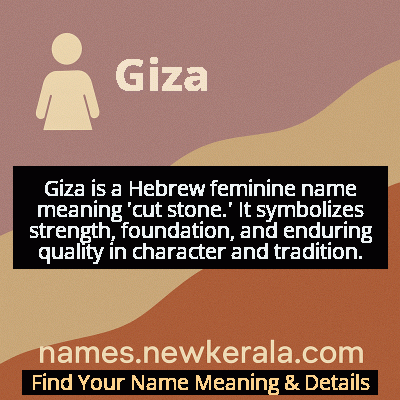Giza Name Meaning & Details
Origin, Popularity, Numerology Analysis & Name Meaning of Giza
Discover the origin, meaning, and cultural significance of the name GIZA. Delve into its historical roots and explore the lasting impact it has had on communities and traditions.
Name
Giza
Gender
Female
Origin
Hebrew
Lucky Number
7
Meaning of the Name - Giza
Giza is a Hebrew feminine name meaning 'cut stone.' It symbolizes strength, foundation, and enduring quality in character and tradition.
Giza - Complete Numerology Analysis
Your Numerology Number
Based on Pythagorean Numerology System
Ruling Planet
Neptune (Ketu)
Positive Nature
Intuitive, analytical, spiritual, and inquisitive.
Negative Traits
Secretive, reserved, aloof, and can be overly critical.
Lucky Colours
Green, yellow.
Lucky Days
Monday.
Lucky Stones
Cat’s eye, moonstone.
Harmony Numbers
1, 5, 6.
Best Suited Professions
Scientists, researchers, spiritual leaders, detectives.
What People Like About You
Depth of knowledge, analytical skills, spirituality.
Famous People Named Giza
Giza Weiss
Israeli poet
Award-winning poet known for modern Hebrew verse exploring themes of identity and landscape
Giza Frankel
Folk art researcher
Pioneering scholar of Jewish folk art and traditional crafts in Eastern Europe
Giza Gershoni
Academic historian
Noted scholar of Middle Eastern studies and Jewish-Arab relations
Name Variations & International Equivalents
Click on blue names to explore their detailed meanings. Gray names with will be available soon.
Cultural & Historical Significance
Throughout Jewish history, the symbolism of cut stone extends beyond physical structures to represent the shaping of character through tradition and learning. Just as stones are carefully cut and placed to create enduring buildings, individuals are shaped by cultural values and religious teachings. The name Giza thus carries connotations of being deliberately formed and purposefully built, embodying the Jewish ideal of developing strong moral and spiritual foundations through lifelong learning and community engagement.
Extended Personality Analysis
Women named Giza typically exhibit a grounded, reliable nature characterized by practical wisdom and emotional stability. They often possess a strong sense of integrity and are known for their steadfastness in relationships and commitments. Like the cut stone their name represents, they tend to be well-defined in their principles and values, showing resilience in facing life's challenges. Their practical approach to problem-solving and ability to provide solid support make them valued friends and family members.
Gizas often demonstrate a quiet strength and determination that manifests in careful planning and deliberate action. They tend to be builders—whether of relationships, careers, or communities—approaching life with a craftsman's attention to detail and quality. While they may not seek the spotlight, their consistent presence and reliable character create foundations upon which others can depend. Their combination of traditional values with practical intelligence makes them effective in roles requiring patience, persistence, and careful construction of long-term goals.
Modern Usage & Popularity
In contemporary times, Giza remains a relatively uncommon but culturally significant name primarily used within Jewish communities, particularly in Israel and among Hebrew-speaking populations. While not among the most popular names, it maintains steady usage among families seeking to honor traditional Hebrew names with strong cultural roots. The name has seen occasional revivals when vintage Hebrew names come back into fashion, often chosen by parents who appreciate its solid, traditional feel and connection to Jewish heritage. Its usage outside Jewish communities remains rare, though it occasionally appears as an exotic or meaningful choice for parents drawn to its stone-related symbolism and melodic sound.
Symbolic & Spiritual Meanings
Symbolically, Giza represents foundation, permanence, and deliberate construction. Like a carefully cut stone that forms part of a larger structure, the name suggests being an essential component of something greater—whether family, community, or tradition. It embodies the idea of being shaped and refined through experience and learning, transforming raw potential into purposeful existence. The symbolism extends to concepts of legacy and endurance, representing how individual lives contribute to the continuity of culture and values across generations. As cut stone implies both strength and artistry, the name carries connotations of beauty achieved through discipline and skillful work.

